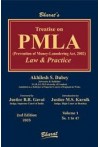
- Author(s): Akhilesh S. Dubey
- Publisher: Bharat Law House
- Edition: 2 Ed 2025
- ISBN 13 9789348080950
- Approx. Pages 2376 + Contents
- Format Hardbound
- Approx. Product Size 24 x 16 cms
- Delivery Time 3-5 working days (within Kerala & South India) (Others 7-9 days)
- Shipping Charge Extra (see Shopping Cart)
......................................................................................................................................
Description
The Prevention of Money-Laundering Act, 2002 (PMLA) was enactedby the Parliament of India to prevent money-laundering and confiscate property acquired from money-laundering. The PMLA came into effect on 1st July, 2005. Its main object was to prevent money-laundering, provide for confiscation of property derived from or involved in money laundering, and punish those who are engaged in the commission of the offence of money-laundering. The Prevention of Money Laundering Act, 2002 (PMLA) was amended several times, in 2005, 2009, 2012, and most recently in 2019, through the Finance (No. 2) Act, 2019. These amendments have introduced new concepts and made changes to existing provisions. For example, the 2019 amendment added the concept of 'reporting entity', which includes a banking company, financial institution, intermediary, etc. The amendment also removed the upper limit of the fine that can be levied
under PMLA, 2002. It provided for provisional attachment and confiscation of property of any person involved in such activities. Moreover, the scope and ambit of the Act has also been enhanced by refining the definition of the offence of money-laundering by the Finance (No. 2) Act, 2019, making it more stringent by including indirect attempt to indulge in activities such as concealing, possession, acquisition, use, projecting or even claiming proceeds of crime as untainted property as punishable offence under the Act. Though the amendments look draconian at first glance, such clarifications are the need of the hour, considering the advancement of technologies in in commercial transactions. The constitutional validity of similar provisions in other Acts have been upheld by the Supreme Court and the High Courts from time to time.
......................................................................................................................................
Table of Contents
Volume 1
The Prevention of Money-Laundering Act, 2002
Chapter I
Preliminary
Section
1. Short title, extent and commencement
2. Definitions
Chapter II
Offence of Money-Laundering
3. Offence of money-laundering
4. Punishment for money-laundering
Chapter III
Attachment, Adjudication and Confiscation
5. Attachment of property involved in money-laundering
6. Adjudicating Authority, composition, powers, etc.
7. Staff of Adjudicating Authorities
8. Adjudication
9. Vesting of property in Central Government
10. Management of properties confiscated under this Chapter
11. Power regarding summons, production of documents and evidence, etc.
Chapter IV
Obligations of Banking Companies,
Financial Institutions and Intermediaries
Section
11A. Verification of identity by reporting entity
12. Reporting entity to maintain records
12A. Access to information
12AA. Enhanced due diligence
13. Powers of Director to impose fine
14. No civil or criminal proceedings against reporting entity, its directors and employees in certain cases
15. Procedure and manner of furnishing information by reporting entities
Chapter V
Summons, Searches and Seizures, etc.
16. Power of survey
17. Search and seizure
18. Search of persons
19. Power to arrest
20. Retention of property
21. Retention of records
22. Presumption as to records or property in certain cases
23. Presumption in inter-connected transactions
24. Burden of proof
Chapter VI
Appellate Tribunal
25. Appellate Tribunal
26. Appeals to Appellate Tribunal
27. Composition, etc., of Appellate Tribunal
28. Qualifications for appointment
29. Term of office
30. Conditions of service
31. Vacancies
32. Resignation and removal
33. Member to act as Chairperson in certain circumstances
34. Staff of Appellate Tribunal
35. Procedure and powers of Appellate Tribunal
36. Distribution of business amongst Benches
37. Power of Chairperson to transfer cases
38. Decision to be by majority
39. Right of appellant to take assistance of authorised representative and of Government to appoint presenting officers
Section
40. Members, etc., to be public servants
41. Civil court not to have jurisdiction
42. Appeal to High Court
Chapter VII
Special Courts
43. Special Courts
44. Offences triable by Special Courts
45. Offences to be cognizable and non-bailable
46. Application of the Code of Criminal Procedure, 1973 to proceeding before Special Court
47. Appeal and revision
Volume 2
Chapter VIII
Authorities
48. Authorities under the Act
49. Appointment and powers of authorities and other officers
50. Powers of authorities regarding summons, production of documents and to give evidence, etc.
51. Jurisdiction of authorities
52. Power of Central Government to issue directions, etc.
53. Empowerment of certain officers
54. Certain officers to assist in inquiry, etc.
Chapter IX
Reciprocal arrangement for assistance in certain matters and
procedure for attachment and confiscation of property
55. Definitions
56. Agreements with foreign countries
57. Letters of request to a contracting state in certain cases
58. Assistance to a contracting state in certain cases
58A. Special Court to release the property
58B. Letter of request of a Contracting State or authority for confiscation or release the property
59. Reciprocal arrangements for processes and assistance for transfer of accused persons
60. Attachment, seizure and confiscation, etc., of property in a contracting state or India
61. Procedure in respect of letter of request
Chapter X
Miscellaneous
Section
62. Punishment for vexatious search
63. Punishment for false information or failure to give information, etc.
64. Cognizance of offences
65. Code of Criminal Procedure, 1973 to apply
66. Disclosure of information
67. Bar of suits in civil courts
68. Notice, etc., not to be invalid on certain grounds
69. Recovery of fine or penalty
70. Offences by companies
71. Act to have overriding effect
72. Continuation of proceedings in the event of death or insolvency
72A. Inter-ministerial Co-ordination Committee
73. Power to make rules
74. Rules to be laid before Parliament
75. Power to remove difficulties
The Schedule
Appendices
......................................................................................................................................
Author Details
Akhilesh S. Dubey Advocate & Solicitor, LL.B, LL.M (University of London), Admitted as a Solicitor of Superior Courts of England & Wales
Foreword by
Justice B.R. Gavai Judge, Supreme Court of India,
Introduction by
Justice M.S. Karnik Judge, High Court at Bombay
